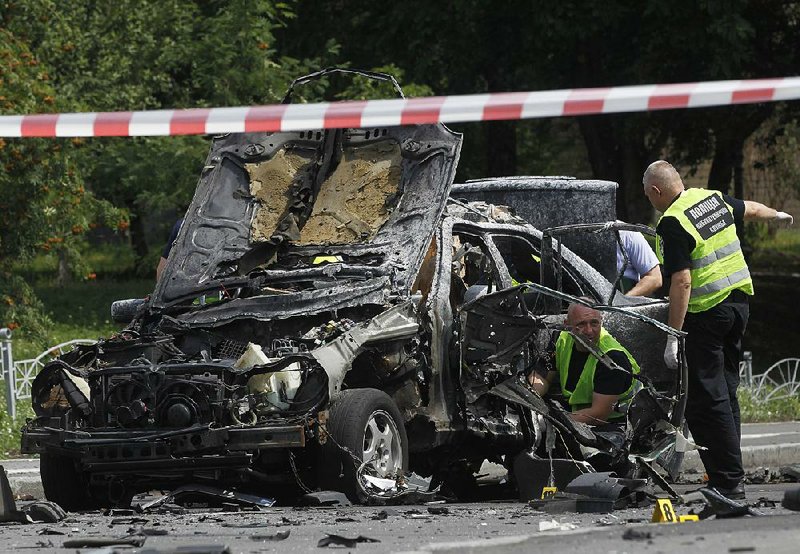Bomb kills Ukrainian intelligence chief
MOSCOW — Authorities said a bomb planted on a car killed a senior Ukrainian military intelligence officer Tuesday in the country’s capital.
Photos from the scene showed the mangled vehicle in the middle of a Kiev intersection. Police said the car’s driver was killed immediately and that two passers-by were slightly injured in the morning blast.
The Defense Ministry identified the victim as Col. Maxim Shapoval of the Chief Directorate of Intelligence. Ukrainian media reported that Shapoval was chief of military intelligence’s special forces.
Kiev’s regional police chief, Andriy Kryshchenko, said the explosive device was either attached to the bottom of the car or planted inside.
Grenades tossed at Venezuelan court
CARACAS, Venezuela — Two grenades were thrown at Venezuela’s Supreme Court from a hijacked police helicopter on Tuesday in a “terrorist and coup” attempt, President Nicolas Maduro said on national television.
The president, who has been facing months of violent anti-government protests, said he had activated an air defense plan against the helicopter, which also flew over the Interior Ministry.
Those responsible for the “terrorist attack on our institutions” will be caught “sooner rather than later,” he said, demanding that the opposition condemn the attack.
Two grenades were thrown, one of which did not explode, said Maduro, who was speaking from Miraflores Palace, the Venezuelan president’s official home. There were no injuries.
The president said the pilot who hijacked the helicopter was linked to former Interior Minister Miguel Rodriguez Torres, who Maduro said was part of a CIA-backed plot to overthrow him.
Earlier Tuesday, Maduro had threatened that he would resort to armed conflict to defend his socialist government.
“If Venezuela was plunged into chaos and violence and the Bolivarian Revolution was destroyed, then we would take up the fight,” he told supporters at a rally in Caracas.
Faulty insulation found at German site
BERLIN — An apartment building in a northwestern German city was evacuated Tuesday because of fears that its exterior insulation is similar to materials that allowed the deadly fire at London’s Grenfell Tower to spread.
The 11-story building is in Wuppertal, Germany. In addition to discovering the sort of insulation material under scrutiny after the blaze in London, government officials found that the building’s escape routes were too close to the facade, making them useless in the event of a fire.
“In principle, the building is a trap,” said Jochen Braun, head of Wuppertal’s construction and housing department. “After we saw what happened in London, we reassessed the situation.”
The evacuation came as cities across Europe examine fire safety, prompted by the incineration two weeks ago of the 24-story tower in London, killing at least 79 people. Tests of exterior cladding on dozens of other public housing complexes have yielded a 100 percent failure rate.
The 73 residents of the building in Wuppertal were either asked to stay with friends and relatives, or were given access to furnished apartments, Braun said.
Authorities have asked the owner of the building to remove the facade and take other measures to eliminate the fire hazard. German media reported that at least 70 other buildings would be tested in Wuppertal alone.
Scots’ leader delays independence vote
LONDON — Scottish leader Nicola Sturgeon told lawmakers Tuesday that she was postponing plans to seek a second independence referendum, saying she would revisit the issue when the terms of the United Kingdom’s departure from the European Union become clearer.
In March, Sturgeon called for a second vote on whether Scotland should break away from the U.K., to be held between late 2018 and early 2019. She said that would give Scots an alternative to an EU exit.
Sturgeon said she had reflected on the issue after the June 8 general election, in which her Scottish National Party lost 21 of its 54 seats in the national Parliament.
“We will not seek to introduce the legislation for an independence referendum immediately,” she told the Scottish Parliament on Tuesday.
But she left options open, saying she still wanted to give Scots a choice at the end of the British exit process when “clarity has emerged” about how Scotland will be affected.
A Scottish independence referendum must be approved by Prime Minister Theresa May’s government for it to be legally binding.

